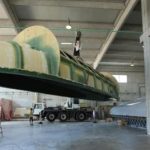Researchers and the military show interest in the mini-submarine.
Josip Oroz, Lovro Stipanović and Martin Sokolović from Samobor have recently won the highest award for an invention at a competition held in the Silicon Valley in the United States. The 3D-printed science submarine has received a gold medal and a special recognition from the Chinese Innovation Association, as part of the competition of 450 innovators from 25 countries, reports Poslovni.hr on August 11, 2018.
The youngsters, under the mentorship of Ivan Vlainić, took part in the SVIIF Innovation Festival 2018, which took place in Santa Clara. The Croatian national team, organised by the Croatian Innovation Association, won two more gold medals, two silver medals, and one bronze medal.
This is not the first prize for the 3D submarine. In late 2017, the team won a gold medal and a special recognition from the Korean Innovation Promotion Agency when they participated in the IENA 2017 International Innovation Exhibition in Nuremberg, Germany.
Josip, Lovro and Martin have been working on the submarine for the last three years, and they started at the Samobor Vocational School. “We met at the school and started working on the project the very same day. We each had our own projects, but we wanted to bring them up to a higher level,” said the students while preparing for the next innovation competition in China.
Josip Oroz is now studying at the Faculty of Transport Sciences, Lovro Stipanović at the Faculty of Mechanical Engineering and Naval Architecture, while Martin Sokolović is still a high school student. They decided to produce their submarine with a 3D printer, which explains the name. As much as 84% of components have been produced by that technology.
“The submarine has eight engines that allow it the freedom of movement in all directions. The batteries are charged with solar energy, while the submarine is controlled by the Bluetooth technology. Most importantly, it has an unlimited range. Thanks to GSM signal, it connects to the mobile internet anywhere in the world, and we can send and receive data. We have also enabled voice-control, which is the best-received feature at fairs and competitions,” said the students.
If the one-metre submarine were to be mass produced, it would could about 1,500 euro. It could be used in a variety of ways, including for research of the sea and lakes, and in search and rescue operations. “At competitions and fairs, the 3D science submarine has drawn considerable market interest, including from the military,” said the students, adding that they were continuing to develop the project.
“We are going to try to start something in Croatia, and we do not intend to move abroad since our careers started here. Moving abroad would be a bad decision because we could just get employed there, and our goal is to use our knowledge and skills to develop our own ideas, and not somebody else’s,” said the innovators.
Translated from Poslovni.hr (reported by Sergej Novosel Vučković).









